By PJ Parrish
I’m a sucker for good settings. Give me a bleak winter woods, a decaying Scotland castle, or a fetid bayou swamp, and I’m a happy-clam reader. Setting, to me, is a character, something to be rendered with great thought and tenderness. Like a good secondary character, it is always there in the background. It is the stage on which your drama unfolds. It is a prism through which you convey mood, tone and even your voice. Most importantly, setting can be an emotional echo chamber for your hero’s inner struggles.
To me, my character’s struggles are almost always reflected in the setting. It goes back to one of my favorite lines from one of the greatest setting novels of all time — James Dickey’s Deliverance:
“I was standing in the most absolute aloneness that I had ever been given.”
But like any good secondary character, setting must assert its presence distinctly but quietly, always in support of the hero and plot, never overshadowing either.
Which brings me to our First Pager today. We’re going to somewhere out in the wilds where a woman is dead in a kayak, with a forest fire raging nearby no less. The writer gives us only two geographic anchors — a village called Forbidden Lake and a large place called Campbell River. Because the cop is called a “constable” I’m guessing we’re in Canada. Google tells me that there is a Campbell River near Vancouver, British Columbia. And near that, an actual place called Forbidden Plateau. Is that the turf our writer is working here? Don’t know. But I’m all in for the ride. See you in a bit…
AT FORBIDDEN LAKE
Smoke from the forest fires had turned the sun into a red dot. In the lake, a faded yellow kayak bobbed gently next to a rotting dock, its occupant slumped over as if in deep sleep.
Detective Kenneth Tingle watched from the shore as paramedics maneuvered a small motorboat toward the kayak. There was no urgency in their movements as they untied it from the dilapidated dock. Even from his vantage point, at least thirty feet away, the gash on the woman’s neck and the blood on the kayak were indication enough: she was dead dead.
Directly behind Detective Tingle, a vacant lot stretched up toward the two-street village of Forbidden Lake. To his left, the Forbidden Lake Resort sprawled along the shore. To his right stood a run-down house that the lake was reclaiming as its own—the roof had more moss than shingles, the paint had peeled beyond recognition. A slight movement in one of the windows was the only indication that the house was occupied. Otherwise, Tingle would have assumed it was condemned.
He tried to scan the faces of the dozen or so people milling around, looking for a guilty expression, an averted gaze, or a perverted smile. But the smoke stung his eyes, so all of the faces were blurred into a mass of homogenous voyeurism. Despite the blur, he liked to think he could tell the difference between the locals and the visitors—the visitors had better posture, their movements more confident. The locals, or at least the ones he assumed were locals—a woman in long, flowing skirts; another woman in a crisp polo shirt and white visor; a few rough-looking men; a teenage girl with her arms tight across her chest—their body language screamed anxious defeat, as if a dead body in a kayak was something they’d come to expect.
Constable Artois appeared at his side, breathless.
“How was the drive?” Tingle asked.
“Slow. Visibility wasn’t great.” Artois’ forehead glistened with sweat. “How was the chopper ride?”
“Visibility wasn’t great either.” Tingle wasn’t a fan of helicopter rides in the best of conditions. He and the paramedics had flown from Campbell River through a dense screen of smoke. His stomach had been in knots, and he’d hated how the paramedics had expressed concern in the chopper—asking him if he was okay, if he needed a vomit bag.
_______________________
First things first. The writing is clean, tight and well-crafted. No overwrought writerly writing. No hiccups or things that made me go, “huh?” I know that sounds like a low bar, but it’s not. Clarity and control are highly underrated qualities. This writer can tell a story.
I love the setting. Murders set in the remote wilderness are almost cliche in crime fiction, as much as neon-lit rain-stained urban streets are. But it works because the plot often transcends hero vs villain to hero also vs nature. Think Craig Johnson, William Kent Kreuger, Nevada Barr…
So this writer is off to a great start, I think. A small, probably insular village (shades of PD James and Georges Simenon!). A bigger-city outsider cop come to play hero. An evocative death scene. And did I mention, there’s a forest fire raging? So kudos, writer. The only thing I would tell you to improve is to find ways at every turn to make that setting work harder for your plot and your character. Your set-up is fine. Pepper in a few more descriptive details so we feel your setting more, especially if you can make it amplify tension. (See my edits that follow).
Now, I do have one issue. I think you need to pay closer attention to your forensics and police procedures. Keep in mind — if your setting is, indeed, not in the States — that readers will need grounding in foreignisms. Tingle, for example, comes from the big town of Campbell River. Is he local cop or Royal Canadian? Find a way to slip this in early. You also need to let us know if we are in Canada or not.
Now to some more detailed points. All we know from your narrative is that a woman’s (girl’s?) dead body is in a kayak with a “gash” on her neck. That’s really not enough information. Consider the time-line for any routine wrongful death discovery:
Someone discovered the body. They were probably able to determine she was dead. They then called 911. Does your village even have 911 or did the person call local constable? As you describe things, the body is close to the village. The constable would not have to come far.
Responding officer (constable) would come first. Your village apparently does not have EMT unit. Constable would find a way to get to the kayak and verify she’s dead. He would then call the larger city authorities and EMTs. Which is why, I assume, you have them helicoptering in.
So that brings Kenneth Tingle on scene. As a homicide detective, he would want to get as close to the body as possible. The kayak is tied to a dock. I like the idea the dock is rotting because it creates tension in accessing the body. Still, he’d get in a boat and go out. By leaving him on land, looking at the local crowd, he comes across as disinterested and even passive. GET HIM TO THE BODY. You can have him thinking about the locals later in a quiet moment.
Other points to consider: I don’t know how much time has passed between the body being discovered and your opening — you should tell us via Tingle’s thoughts. But by now, wrongful death would probably be determined, and there might be other officers nearby in waders and boats, assisting.
I understand your point about bringing in the onlookers now — it sets up your line: “Their body language screamed anxious defeat, as if a dead body in a kayak was something they’d come to expect.” And that creates tension because it implies this isn’t the first murder in Forbidden Lake. Great! Love it. But it comes at the expense, as I said, of making your hero look like a spectator and muser. Which is death to a hero.
Get Tingle involved. Get him out there. Get him moving and doing. Not just thinking.
Okay, a quick line edit and we’re done. My comments in red.
Smoke from the forest fires had turned the sun into a red dot. In the lake, a faded yellow kayak bobbed gently next to a rotting dock, its occupant slumped over as if in deep sleep. Nice opening image.
Detective Kenneth Tingle watched from the shore passively as paramedics maneuvered a small motorboat toward the kayak. There was no urgency This phrase sort of drains the tension out of your opening. There can be a feeling of urgency even with a dead body in that the hero feels compelled TO ACT. I would have him in an inflatable raft approaching the kayak so he can SEE the body and TELL us what it looks like. Is she young, old? What is she wearing? Dark hair in wet strands like kelp across her face? in their movements as they untied it from the dilapidated dock. Even from his vantage point, at least thirty feet away, the gash on the woman’s neck and the blood on the kayak were indication enough: she was dead dead. He already knew she was dead; that’s why he was called here. And again, he’s onshore, watching, thinking. ACTION FIRST, REACTION AND SECONDARY THOUGHTS LATER. Also: a “gash” can imply something minor. Get a little more gritty here. SHOW US what he is seeing.
Also an important point: If this woman/girl is local, the constable or someone would recognize her. Make that clear. It also increases tension, one way or another.
You need some juicy dialogue in your opening. The exchange between Tingle and Artois is wasted cop banter. What if Artois is with Tingle in the raft and recognizes her? Now, that is juicy dialogue.
The next two graphs are well-rendered as far as setting goes, but I think they come too early in your opening and thus leach tension. Suggest having Tingle examine the body as well as he can from a bobbing raft, maybe with dialogue with Artois. Give him some quick thoughts and maybe directing EMTs to bag her and get her to land. Give him some forensic smarts — he can tell from the wound it was murder.
Then I’d take Tingle back to shore. Artois can go handle the gathering crowd. Tingle can then watch the conveying of the body and in this quieter moment, can give us a very quick lay of the land of Forbidden Lake, the big resort and the rundown house. ONLY then would I have him turn his focus to the crowd.
Directly behind Detective Tingle, a vacant lot stretched up toward the two-street village of Forbidden Lake. To his left, the Forbidden Lake Resort sprawled along the shore. To his right stood a run-down house that the lake was reclaiming as its own—the roof had more moss than shingles, the paint had peeled beyond recognition. A slight movement in one of the windows was the only indication that the house was occupied. Otherwise, Tingle would have assumed it was condemned.
He tried to scan squinted through the sting of the smoke to scan the faces of the dozen or so people milling around, behind the police tape. He was looking for a guilty expression, an averted gaze, or a perverted smile. But the smoke stung his eyes, so all of the faces were blurred into a mass of homogenous voyeurism. This line seems a tad overwrought in your nicely spare style. Despite the blur, he liked to think he could tell the difference between the locals and the visitors Is Forbidden Lake a big tourist destination as this implied? You need to make that clear. . visitors had better posture, their movements more confident. The locals, or at least the ones he assumed were locals—a woman in a long, flowing skirts; another woman in a crisp polo shirt and white visor; a few rough-looking men; a teenage girl with her arms tight across her chest—The only place where you confuse me. A woman in a crisp polo shirt and visor screams tourist to me. their body language screamed anxious defeat, as if a dead body in a kayak was something they’d come to expect. Interesting line that creates a little tension but what comes before it does not support it. Try to be more specific. Something like:
It was July and Forbidden Lake’s tiny population was, as usual, swollen with tourists. Artois was having a time keeping them behind the police tape. Tingle squinted through the sting of the smoke at the faces in the crowd. He liked to think he could tell the locals from the tourists — the man in the crisp polo shirt and visor, the thin woman in the flowing dress focusing her cell phone camera, definitely out of town. The others were different — sun-roughed men in jeans and t-shirts, a teenage girl with arms crossed tight over her chest — locals, he suspected. In their slumped postures and grim faces he could read something strange, like anxious defeat, as if a dead body in a kayak was something they had come to expect.
Constable Artois appeared at his side, breathless.
“How was the drive?” Tingle asked.
“Slow. Visibility wasn’t great.” Artois’ forehead glistened with sweat. “How was the chopper ride?” This is wasted dialogue. Does nothing to propel plot or increase tension and that is what you need in the opening pages. If you want to make a point of Tingle getting knotty in the copter, have Artois rejoin them and they can talk. But do you really want to waste precious moments on such small stuff so early?
“Visibility wasn’t great either.” Tingle wasn’t a fan of helicopter rides in the best of conditions. He and the paramedics had flown from Campbell River through a dense screen of smoke. His stomach had been in knots, and he’d hated how the paramedics had expressed concern in the chopper—asking him if he was okay, if he needed a vomit bag.
Okay, that’s all. Don’t let the blood all over your pages discourage you, dear writer. As I often say, the more I like your work, the more I want you to try harder. This is really good stuff and you’re off to a fine start. I would read on. Just be more careful with your forensics and take care that Tingle doesn’t become a wall flower at his prom. Well done!
Postscript. About your title. Love it. But I strongly suggest you lose the “AT” and just call it Forbidden Lake. It has resonance and intrigue. There’s good reason Dennis Lehane didn’t call his book “On Mystic River” or William Kent Kreuger didn’t call his book “In Blood Hollow.”
 Oh yes! If you’d like to get in on the ground floor of the Romeo series, the first book, Romeo’s Rules, is now 99¢ on Kindle for a limited time. Order here.
Oh yes! If you’d like to get in on the ground floor of the Romeo series, the first book, Romeo’s Rules, is now 99¢ on Kindle for a limited time. Order here.


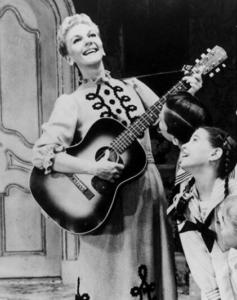
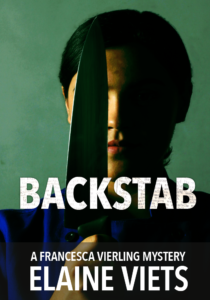 By Elaine Viets
By Elaine Viets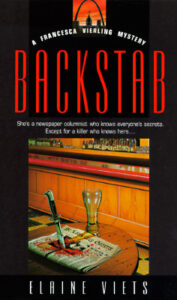
 But “Backstab” includes some funny stories from my time as a newspaper columnist in St. Louis. One favorite was a true story of a parking spot. St. Louis is a city where the parking spot is sacred — and never more so than on a snowy day. Those of you who have survived snowy winters know this.
But “Backstab” includes some funny stories from my time as a newspaper columnist in St. Louis. One favorite was a true story of a parking spot. St. Louis is a city where the parking spot is sacred — and never more so than on a snowy day. Those of you who have survived snowy winters know this. Please excuse my absence over the last 7-10 days while I was on deadline. I’m usually a better multitasker. *sigh*
Please excuse my absence over the last 7-10 days while I was on deadline. I’m usually a better multitasker. *sigh*
 We lost
We lost 
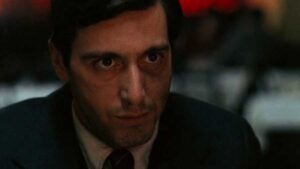
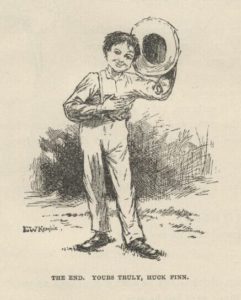 An Englishman met Mark Twain on a train and abruptly said, “Mr. Clemens, I would give ten pounds not of have read your ‘Huckleberry Finn!’ ” Twain raised his eyebrows, awaiting an explanation. The Englishman smiled, and added, “So that I could have again the great pleasure of reading it for the first time.”
An Englishman met Mark Twain on a train and abruptly said, “Mr. Clemens, I would give ten pounds not of have read your ‘Huckleberry Finn!’ ” Twain raised his eyebrows, awaiting an explanation. The Englishman smiled, and added, “So that I could have again the great pleasure of reading it for the first time.”